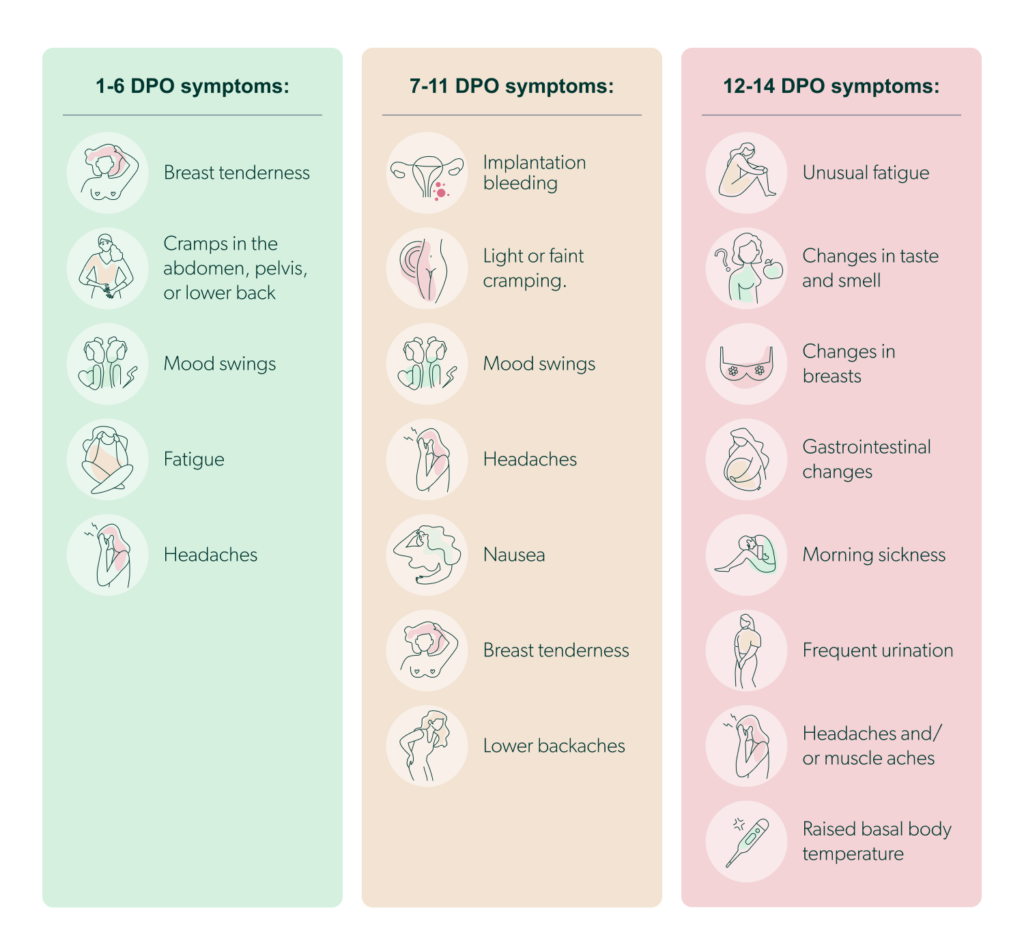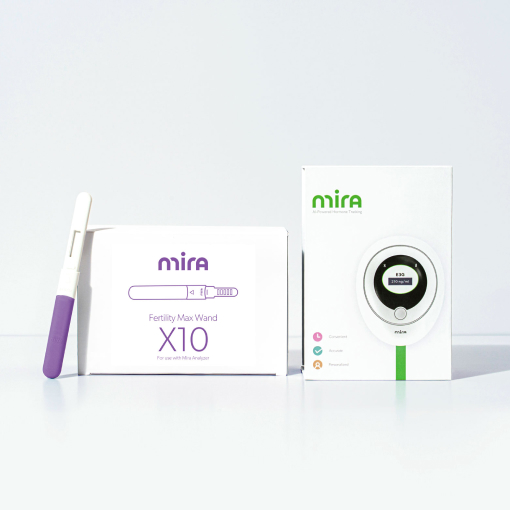DPO Symptoms: What to Expect From 1 to 12 Days Past Ovulation

When you’re trying to conceive (TTC), waiting to take a pregnancy test can feel like the longest wait in the world. Even if you’re familiar with the intricacies of home pregnancy tests and when to take them, you might still be wondering why you have to wait two weeks for the most accurate results. Wonder no more!
We know that waiting is hard, especially when it feels like your dreams are on the line. While you’re waiting, you might be eager to keep an eye out for any potential signs of pregnancy in your body. Every little twinge can send you down a google rabbit hole of early pregnancy signs and DPO symptoms. To help you understand what’s going on in your body, we’ve broken down what you might experience post ovulation, including early pregnancy symptoms day-by-day, and what you can expect after an egg gets fertilized. We’ll break down exactly what happens and when it happens during those days past ovulation (DPO) so you know what to expect during the two-week wait (TWW).
What Is DPO in Pregnancy?
The fertility world is full of acronyms and abbreviations that might be confusing for the average person just trying to get pregnant. Two common ones, especially when you’re trying to conceive (TTC) are DPO and TWW.
DPO stands for “days past ovulation” or “days post ovulation” and refers to the amount of time that has passed after ovulation has taken place. It occurs during the luteal phase of your menstrual cycle, post ovulation, and before your next period.
TWW stands for the “two week wait” and is the time between ovulation and either your next period, or a positive pregnancy test. Together, the days past ovulation make up the two week wait (TWW). The name comes from the fact that it takes approximately two weeks for the pregnancy hormone hCG to rise enough for a pregnancy test to detect it. This also explains why the best time to take a pregnancy test is typically no sooner than 12 days past ovulation (DPO) so there is enough hCG in your system to detect a pregnancy.

As an example, if you ovulate on a Friday, then the very next day (Saturday) is the first day past ovulation, or 1 DPO. Sunday would be considered 2DPO and the count continues until the first day of your next period if you’re not pregnant.
- Friday – ovulation
- Saturday – 1 day past ovulation (DPO)
- Sunday – 2 DPO
- Monday – 3 DPO
- Tuesday – 4 DPO
- Wednesday – 5 DPO, etc.
Tracking days past ovulation (DPO) can help you plan for the best time to take a pregnancy test and help you monitor and track early symptoms of pregnancy. The two week wait can be a stressful and nerve-wracking time so it can be helpful to understand what to expect. Waiting is hard but if you know what’s going on behind the scenes, it can make it easier to endure.
Pregnancy Symptoms After Ovulation Day by Day
Days 1-6 Past Ovulation (1-6 DPO)
After the crucial moment of ovulation, the released egg is only viable and available for about 24 hours. You need to have sex in the five days before or the 24 hours after ovulation for the best odds of pregnancy. If the egg is successfully fertilized, it becomes an embryo and begins the process of development and prepares for implantation.
As the embryo develops, but has not yet implanted, important hormonal changes are taking place in preparation for pregnancy. The structure that formed in the ovary after the egg is released, the corpus luteum, produces progesterone to support implantation and early pregnancy. It helps thicken and prepare the uterine lining for implantation and will continue until the placenta takes over.
According to the NHS’ pregnancy timeline, implantation is likely to take place within 5-6 days after ovulation and is considered the official start of a pregnancy. Once implantation occurs, hCG (human chorionic gonadotropin) levels should rise rapidly. Often called “the pregnancy hormone”, it’s the hormone that home pregnancy tests detect and on average, is detectable as early as 8 days after conception.
1-6 DPO symptoms
Whether the egg becomes fertilized or not, your body is producing more progesterone during this time to prepare for a potential pregnancy. Any pregnancy symptoms you feel during the first 6 DPO will most likely result from the effects of progesterone on your body and mood, very similar to those you may experience before your period.
Those symptoms include:
- Breast tenderness
- Cramps in the abdomen, pelvis, or lower back
- Mood swings
- Fatigue
- Headaches
Days 7-11 past ovulation (7-11 DPO)
Typically, implantation happens 6-12 days after fertilization when the developed embryo reaches the uterus and implants into the uterine lining. Elevated progesterone levels work to get your uterus ready to accept, implant, and maintain a fertilized egg. This is made possible through hCG, which encourages the corpus luteum to produce progesterone and other hormones.
Without hCG, your body couldn’t produce enough progesterone to sustain a pregnancy but once the placenta is fully formed, it takes over progesterone production. Until that time, hCG is needed for support. Progesterone helps create a nurturing environment for the developing baby and also prevents muscle contractions in the uterus. During early pregnancy, hCG indicates baby growth and pregnancy status and is commonly used by healthcare practitioners to assess your pregnancy health.

A little extra support from an expert can go a long way
Book an online consultation with one of our Hormone Health Coaches.
Schedule Now7-11 DPO symptoms
Most people won’t feel implantation, but a small percentage might experience bleeding or spotting during early pregnancy as the embryo burrows into the uterine lining. Often called implantation spotting, it differs from the average period in both timing and consistency. According to the American Pregnancy Association, implantation bleeding is usually light pink to dark brown in color and much lighter than period flow. It’s considered an early pregnancy symptom but not all people will experience this phenomenon.
Along with implantation bleeding, you may experience the following symptoms:
- Light or faint cramping (less painful than your normal period cramps), which may be accompanied by pulling and/or tingling sensations.
- Mood swings
- Headaches
- Nausea
- Breast tenderness
- Lower backaches
These DPO symptoms are very common and are similar to the signs of the second part of your cycle, the luteal phase, or an upcoming period. Even though hormonal changes like those seen in early pregnancy affect almost every system in your body, it’s still not time for a pregnancy test. You’ll have to wait a little longer until your body produces a significant amount of pregnancy hormone (hCG) before experiencing any sure symptoms of pregnancy.

Days 12-14 past ovulation (12-14 DPO)
In a typical 28 day cycle, days 12-14 past ovulation are the end of your luteal phase and when your period is due. A missed period is often the first sign of pregnancy and many of those early signs are similar to what you might experience right before your period thanks to increased progesterone production.
If you are pregnant, progesterone levels will stay high as levels of estrogen and hCG gradually rise. By 12-14 days past ovulation, you should have enough hCG in your system to be detectable by a home pregnancy test and your symptoms may become more noticeable over time.
Remember, the earliest day you should take a pregnancy test is the first day of your next expected period. Taking a pregnancy test too early could mean a false-positive or false-negative result.
12-14 DPO symptoms
According to the National Institutes of Health, as hCG hormone levels grow, you may experience these early pregnancy symptoms:
- Unusual fatigue (feeling sleepy), dizziness, or lightheadedness (feeling wobbly, often when you get up after lying down). This happens due to changes in blood vessels carrying oxygen to the brain — not to mention that a huge amount of energy goes into building a placenta, the life-support system for your baby!
- Changes in breasts, such as darkening in the color of the nipples, soreness, or nipple sensitivity. Breasts can swell, feel heavy and full, feel tender, tingle, or even itch.
- Changes in taste and smell, specific food cravings, strong aversion to certain foods and smells, or a metallic taste in your mouth.
- Gastrointestinal changes, such as increased hunger, cramping, bloating, water retention, diarrhea, or constipation.
- Morning sickness. Nausea, especially when you are hungry, and/or vomiting may happen at any time of day, despite what the name suggests!
- Frequent urination. The need to empty the bladder more often is caused by pregnancy hormones that increase blood flow to the kidneys and pelvic region.
- Headaches and/or muscle aches.
- Raised basal body temperature, and/or changes in blood pressure and heart rate. During pregnancy, the body pumps more blood to carry nutrients to the fetus, which can cause changes in temperature, blood pressure, or heart rate.
Some people cannot explain any specific symptoms or changes in their bodies, but they intuitively feel that something is “off:” they describe it as feeling unlike themselves or different than usual.
Symptoms can give you some idea if you might be pregnant, but they can also be similar to those you experience during PMS. The best way to know if you are pregnant is to monitor changes in your hormone levels. The Mira Fertility Tracker can analyze your exact fertility hormone concentrations for a more precise indication of whether or not you are pregnant.
Want to explore DPO symptoms in more depth? Check out our dedicated DPO guides:
- 1 to 3 DPO symptoms
- 4 DPO symptoms
- 5 DPO symptoms
- 6 DPO symptoms
- 7 DPO symptoms
- 8 DPO symptoms
- 9 DPO symptoms
- 10 DPO symptoms
- 11 DPO symptoms
- 12 DPO symptoms
DPO Symptoms: What if You’re Not Pregnant?
Regardless of whether you are trying to conceive or not, the two-week wait can be a notoriously frustrating time. No symptom alone can confirm pregnancy and every person is different. The only way to confirm pregnancy is by taking a pregnancy test but there are some benefits to knowing what is happening internally if you’re not pregnant.
Recommended for you
Navigate your fertility with peace of mind
What’s happening in your body if you’re not pregnant
Your menstrual cycle is what prepares your body for pregnancy each month, but if that doesn’t happen it returns to a predictable series of events to carry on for the next month. If a fertilized egg hasn’t found its way to the lining of your uterus for implantation, that lining is no longer needed and the familiar shed and subsequent bleeding will eventually take place.
Frequently Asked Questions
What is DPO?
DPO stands for “days past ovulation.” It’s used to track early pregnancy symptoms and plan for testing.
Can DPO symptoms be mistaken for PMS?
Yes, DPO symptoms like headache, fatigue, and cramping can resemble PMS. Key signs of early pregnancy include breast tenderness, nausea, and a missed period.
What if I don’t have any symptoms?
Not everyone experiences early pregnancy symptoms. The best way to confirm is by taking a pregnancy test at the right time.
When should I take a pregnancy test?
Take a test at least one day after your expected period. For a 28-day cycle, this is 14 DPO.
Are early pregnancy tests accurate?
Early tests detect hCG in about 76% of cases before a missed period. For higher accuracy, test on the day of your missed period.
What if I have severe symptoms?
If symptoms become severe or disruptive, consult your doctor for further evaluation.
What are the chances of getting pregnant 1-12 DPO?
You are only fertile for up to 24 hours post-ovulation. The chance of pregnancy during this time is about 11-13%.
Can I be pregnant and test negative?
Yes, a negative test can happen if you test too early or if hCG levels are too low to detect. Consider retesting a few days later.
What can cause feeling pregnant if the results are negative?
Hormonal fluctuations, stress, or underlying health issues can cause pregnancy-like symptoms even if you’re not pregnant.
Can people experience pregnancy symptoms 48 hours after conception?
It is extremely unlikely that you will experience pregnancy symptoms 48 hours after conception. Most symptoms don’t begin until implantation, which typically takes place 6-12 days after ovulation.
How many days past ovulation will you get a positive result?
You might get a positive result as early as 8 days past ovulation if the test used is sensitive enough to pick up trace levels of hCG. Those results may not be accurate and can result in a false-negative or positive result from a chemical pregnancy. Always wait the recommended 12-14 DPO for the most accurate results.
Mira’s Editorial Process
All content produced by Mira meets stringent editorial standards, ensuring excellence and accuracy in language and medical precision. Every piece undergoes thorough fact-checking and review by qualified professionals. Check out our full editorial process to learn more.














